
The Future of Fashion is Green and Ethical
It is now becoming mainstream knowledge that the fashion industry is of the most wasteful and environmentally harmful industries in existence. Demand for fast fashion, and a huge increase in clothing production and consumption, has left many companies with little to no regard for the long term impact on the environment. Big fast fashion companies are using synthetic materials that are non-biodegradable, using large amounts of water for dying process, and producing toxic waste in underdeveloped countries. Many of these countries have little infrastructure for dealing with the massive amounts of chemicals being poured into their communities. Aside from practices that are harmful to the planet, fast fashion companies often source their production in factories that exploit workers through unfair wages and unsafe working conditions.
For many consumers, this sort of news left them with a big sense of distrust for the brands they had once supported. It became evident that the fashion industry needed to take active steps to change the way that clothing was being produced, and we have been seeing major changes in recent years. Fashion companies have since begun to increase their use of natural fibers that are easier on the planet and, have adopted more ethical business philosophies.
Sustainable Materials That Are Changing The Game
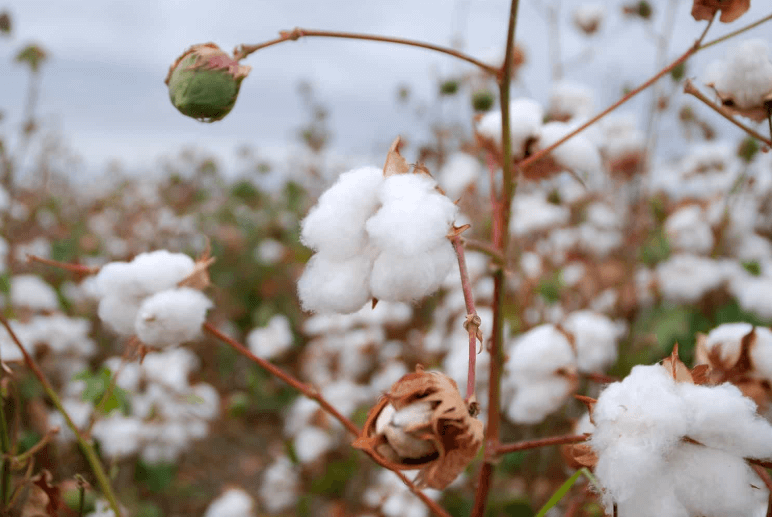
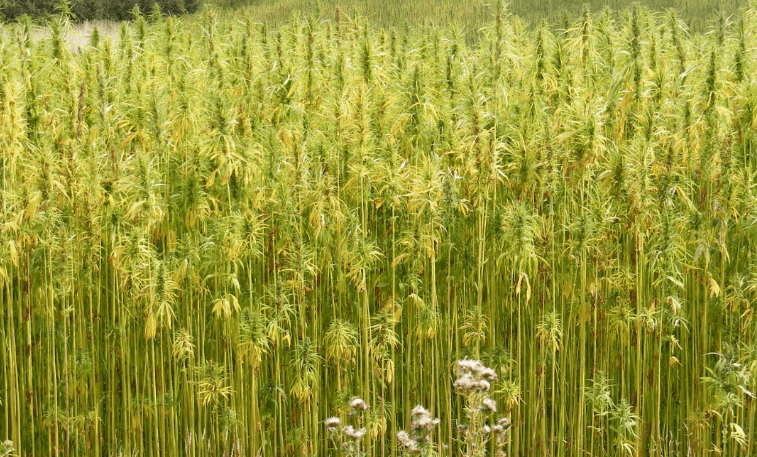
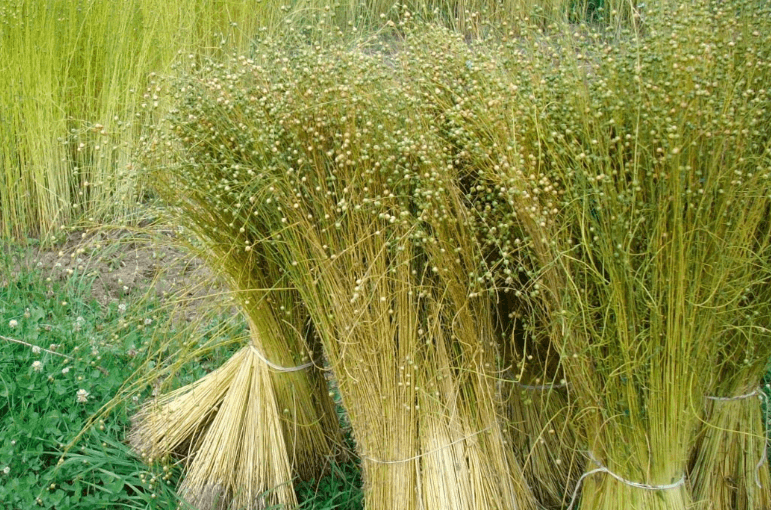
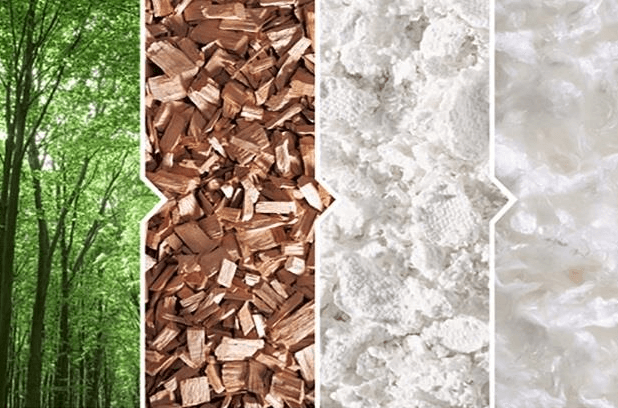
Organic Cotton:
Cotton is one of the most recognized natural fibers out there, and it honestly deserves all of the credit that it receives. There are many reasons that you should be looking for that cotton label next time you do some wardrobe shopping. First and foremost, supporting cotton is supporting farmers and their families, which is great for communities and growth. Secondly, unlike petroleum based synthetic fibers, cotton is a plant, thus making it biodegradable… so when that t-shirt gets a hole in it and you have to throw it away, it won’t sit in a landfill for all eternity. Lastly, cotton just has a superior feel than many synthetic fibers. Because it is natural, it is breathable, meaning it is soft and won’t trap in sweat. It’s better for you and better for the Earth.
Hemp:
Hemp gets a bad rep because of it’s association to cannabis, but what many people don’t know is that Hemp has been used in clothing for centuries. Hemp is something called a “bast fiber”, meaning that the fiber itself comes from the stem of the plant. These fibers are then woven together in order to create a sturdy woven fabric that can keep the wearer warm, and protect them from harmful UV rays. What makes Hemp a really stand out sustainable fiber is the fact that it requires a very low amount of water to grow (fifty percent less than cotton, if you can believe it). This plant is also classified as a “weed”, which means that it grows easily and quickly without the need of harsh pesticides. A little goes a long way when it comes to this amazing fiber, and it really could be a game changer in terms of future sustainability efforts in the industry.
Linen:
Who doesn’t love a white Linen summer party? It is the fabric that everyone knows is super breathable….. and also quick to get a few wrinkles, but we can let that minor detail slide durning the warmer months. There are so many benefits when you buy Linen products that it makes up for the fact that you may have to iron it a few times to get it just right. First off, like Hemp, Linen is a bast fiber, meaning that it is strong and biodegradable. Linen is also naturally moth resistant, so you wont have to worry about pesky little holes appearing on your garments overnight. Unlike other fibers, Linen comes in an array of colors naturally. From light grays to whites, linen is naturally beautiful, so there isn’t always a need for harsh chemical dyes that have a negative impact on the environment.
Tencel:
Tencel is a newer natural fiber that comes from wood pulp. Have your eye out for the words lyocell and modal fibers next time you are reading your clothing labels. This means that your clothing is made from wood using recyclable solvents (very scientific). This fiber is really easy to like because it is so soft and gentle on skin, making it not only perfect for clothing, but for things like bedding and furniture as well. It is very durable without being rough touch. What is perhaps the most interesting aspect of Tencel is that it uses a loop production process. What this means is that they do the most that they can to make sure that they can recycle the water that is used as well as the solvents required for the spinning process. This means that consumers can be reassured that their Tencel products are not straining on the environment. It may not be as recognizable as cotton at the moment, but Tencel is building a stronger presence in the fashion industry, and will surely become a well known material to the everyday consumer.
Fashion Brands Leading The Way
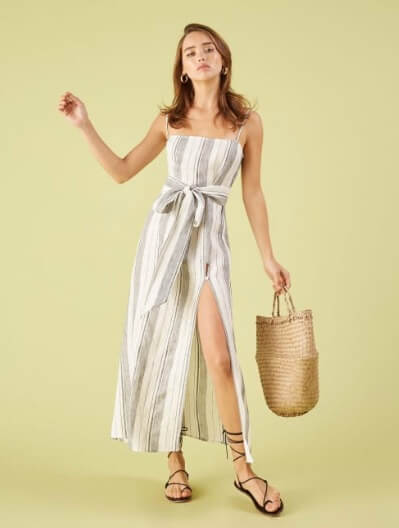
Reformation:
This LA based brand started back in 2009 selling redesigned vintage clothing in an attempt to show the world that recycled fashions could be both stylish and sustainable. Founded by Yael Aflalo, Reformation set up shop selling a wide range of womenswear, from party dresses to something as basic as a good pair of jeans and t-shirts. Since the company’s launch, it has grown at an extortionately fast rate, developing a very distinguishable aesthetic that could be best described as simple, feminine, and a little bit sexy.
What is really incredible about the Reformation brand, is that it is one of the largest (and growing) sustainable brands that is considered a true “fashion” brand. Every season it comes out with amazing new styles that seem to trickle their way down into the many levels of the fashion industry. Its name is fitting, as Reformation is quite literally reforming the way that many companies see the production of clothing. Through their top fashion PR efforts and leading sales, they have shown the fashion industry that small changes in the way that production is carried out can actually make a huge difference. Using less water, sustainable and biodegradable materials such as Cotton, Linen, and Tencel, earth friendly dyes, and recycling fabric, they have managed to reduce waste and save a lot of money on production costs, keeping the bran affordable and accessible to consumers. Reformation is definitely a brand to watch in the sustainability movement.
Everlane:
Everlane is making strides in the fashion industry through its philosophy on ethics and company transparency. They begin any production process by sourcing factories that have ethical practice such as fair wages for their workers, good working conditions, and earth friendly production methods. They are so open with their consumers that they have developed their very own name for their business method called “Radical Transparency”. This is a real awakening in the fashion industry, as fast fashion brands are normally a bit secretive about their production methods (and they usually end up being unethical). Everlane is setting a new standard in the way that fashion businesses approach production. Moreover, Everlane is focusing on product quality and longevity. If a product is made from a quality material (such as Grade-A Cashmere or organic cotton), those products will last longer and not have to be thrown away. This is a direct 180 from the fast fashion approach of “quantity over quality”, but it might be just what Mother Earth needs.

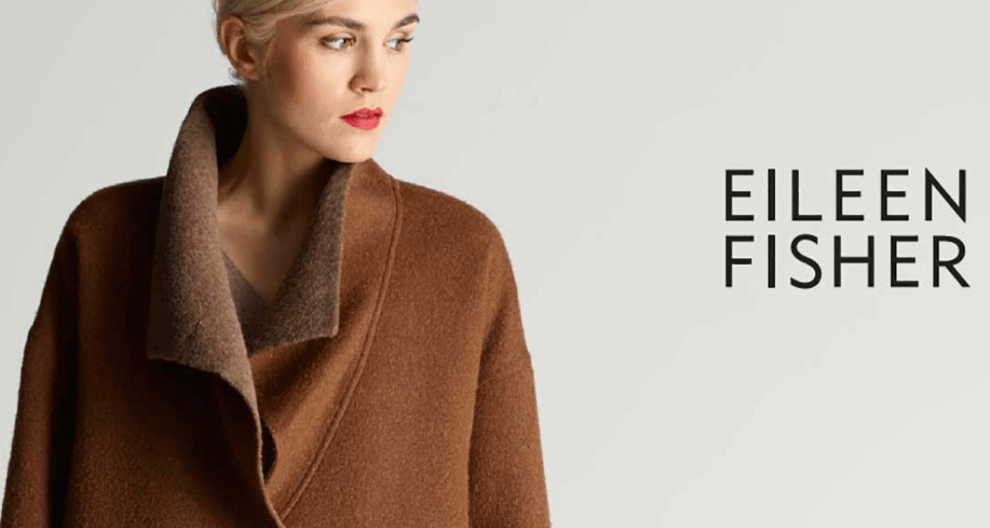
Eileen Fisher:
Most People know Eileen Fisher as a clothing brand for the more sophisticated woman, and a bit for being on the pricer side, but not many people are aware that Eileen Fisher takes a lot of pride in sustainability efforts. For several years now, Eileen Fisher has pushed for the use of organic and Earth friendly materials to be used in the production of their products. Organic Cotton, Tencel, and Linen are consistently used by the label year round. Eileen Fisher also follows the philosophy of making higher quality clothing that will last their customers for years to come, and if for any reason a customer manages to tear or damage an article of clothing, they can bring it into the store for a free repair instead of just throwing it away. What is most inspiring about the Eileen Fisher brand is that they are still not fully satisfied with their sustainability efforts (even though they have accomplished so much). They are constantly trying to make improvements in their production methods, such as aiming for chlorine free wool and safer dying processes. What is very clear is that when it comes to making clothing the ethical way, Eileen Fisher is a leader in the industry.
What's Next
We can’t always be sure of what is to come in the future, but we can be sure that changes need to be made if we want our planet to survive. As Industry insiders it is so important to be aware that there are new sustainable materials and ethical production methods out there. As responsible consumers, it is important to learn about what you are buying so that you can make sure it isn’t harming our planet. Changes come from within, and from the outside as well. What I feel we can truly expect, is change on a big scale when it comes to sustainability in the fashion industry.
